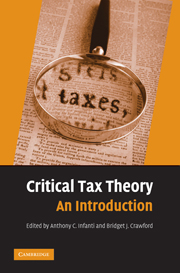Book contents
- Frontmatter
- Contents
- List of Illustrations
- List of Tables
- List of Contributors
- List of Common Abbreviations
- Introduction
- CHAPTER 1 FOUNDATIONS OF CRITICAL TAX THEORY
- CHAPTER 2 HISTORICAL PERSPECTIVES ON TAXATION
- CHAPTER 3 THE GOALS OF TAX POLICY
- CHAPTER 4 CRITICAL TAX THEORY MEETS PRACTICE
- CHAPTER 5 RACE AND TAXATION
- CHAPTER 6 GENDER AND TAXATION
- CHAPTER 7 SEXUAL ORIENTATION AND TAXATION
- CHAPTER 8 THE FAMILY AND TAXATION
- CHAPTER 9 CLASS AND TAXATION
- CHAPTER 10 DISABILITY AND TAXATION
- CHAPTER 11 GLOBAL CRITICAL PERSPECTIVES ON TAXATION
- CHAPTER 12 CRITICAL PERSPECTIVES ON CRITICAL TAX THEORY
- Redistributive Justice and Cultural Feminism
- Taking Critical Tax Theory Seriously
- A Feminist Perspective on the QTIP Trust and the Unlimited Marital Deduction
- Caring Enough: Sex Roles, Work, and Taxing Women
- Index
Taking Critical Tax Theory Seriously
Published online by Cambridge University Press: 04 August 2010
- Frontmatter
- Contents
- List of Illustrations
- List of Tables
- List of Contributors
- List of Common Abbreviations
- Introduction
- CHAPTER 1 FOUNDATIONS OF CRITICAL TAX THEORY
- CHAPTER 2 HISTORICAL PERSPECTIVES ON TAXATION
- CHAPTER 3 THE GOALS OF TAX POLICY
- CHAPTER 4 CRITICAL TAX THEORY MEETS PRACTICE
- CHAPTER 5 RACE AND TAXATION
- CHAPTER 6 GENDER AND TAXATION
- CHAPTER 7 SEXUAL ORIENTATION AND TAXATION
- CHAPTER 8 THE FAMILY AND TAXATION
- CHAPTER 9 CLASS AND TAXATION
- CHAPTER 10 DISABILITY AND TAXATION
- CHAPTER 11 GLOBAL CRITICAL PERSPECTIVES ON TAXATION
- CHAPTER 12 CRITICAL PERSPECTIVES ON CRITICAL TAX THEORY
- Redistributive Justice and Cultural Feminism
- Taking Critical Tax Theory Seriously
- A Feminist Perspective on the QTIP Trust and the Unlimited Marital Deduction
- Caring Enough: Sex Roles, Work, and Taxing Women
- Index
Summary
Among the most interesting and important developments in tax scholarship in recent years has been the growth of feminist tax policy analysis. Very recently, several examples of critical race theory tax analysis have also appeared. There also have been several articles proposing reforms in the taxation of same-sex couples. All these approaches can be subsumed under the label of critical tax analysis.
The interest of tax academics in such issues is long overdue. Precisely because of the importance of the endeavor, however, I am troubled that much of the work has not been carefully done. Four problems, in particular, weaken much of the literature.
The first problem is an overeagerness to accuse the tax laws of hostility to women or blacks. In the case of feminist analysis, this often results from failure to acknowledge the fundamental conflict between the feminist goals of changing traditional gender roles and helping those women who are already committed to traditional roles. It is difficult – sometimes impossible – to pursue one goal without interfering with pursuit of the other goal. Yet much feminist tax policy analysis pays scant attention to this dilemma. This is sometimes reflected in a readiness to accuse Congress of sexism (conscious or unconscious) whenever it acts to pursue one feminist goal at the expense of the other.
Closely related to the first problem is a failure to recognize the diversity within feminist thought. This has sometimes led to adoption of difference feminism as a guide to tax policy, without considering the powerful critiques within feminism of difference feminism, and without considering the likelihood that public policy founded on this version of feminism will prove counterproductive for women.
- Type
- Chapter
- Information
- Critical Tax TheoryAn Introduction, pp. 371 - 380Publisher: Cambridge University PressPrint publication year: 2009



